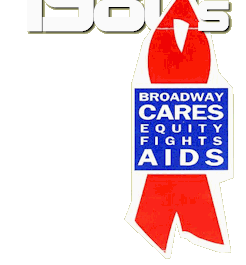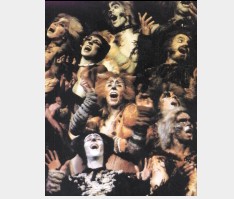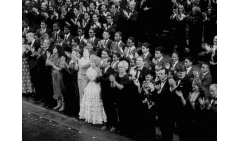 |
|
 |
Intro | First Years | 1919 | 1920's | 1930's | 1940's | 1950's | 1960's | 1970's | 1980's | 1990's 2000-2003 | 2004 | 2005 | 2006 | 2007 | 2008 | 2009 | 2010 | 2011 | 2012 | 2013 |
 |
"How long, O Government?" |

1980
February 27
The fight to save the theatres continues. At a huge rally in front of the Helen Hayes Theatre, hundreds of Equity members gather to protest the demolition. Donald Grody sums it up: "To demolish these theatres, which are the essential heritage and vitality of New York, in order to build a hotel whose guests come for that very vitality is a desperately wasteful and short-sighted plan." After numerous terminations in the Broadway production of Annie, The League of New York Theatres and Producers agrees to the inclusion of a "Just Cause" provision in the contract, requiring specific warning and clear reasons be given to an Actor before termination. Severe penalties are established for firing without just cause. February
Equity's new national headquarters opens at 165 West 46th Street. Equity will retain ownership of this property into the future. August 25
The opening night of 42nd Street at the Winter Garden is marred tonight by the curtain call announcement by producer David Merrick that director Gower Champion has died. The show will go on to play 3,486 performances. November 12
Playwrights Michael Weller, David Mamet, Romulus Linney, Barbara S. Graham, John Olive and James Childs serve AEA with a lawsuit challenging the conversion/subsidiary rights provisions set forth in the AEA Funded Non-Profit Theatre Code, and the AEA Approved Showcase code, which guarantees work for Equity members if showcases go on to further productions. The suit will be settled next year through a consent agreement. November
Ronald Reagan, former President of SAG, is elected President of the United States. December 8
Former Beatle John Lennon is shot and killed. 1981
January
Equity appeals to its members for a dues increase. Since the last increase, membership has grown from 15,000 to 27,000, and Equity is the only major union in the AFL-CIO that has not raised its dues since 1973. In April, members turn out in record numbers for the dues referendum and vote more than three to one for the increase, establishing for the first time a weekly working dues system. January 20
The hostages in Tehran are freed. May
In a landmark decision, the Supreme Court unanimously rules that "Equity has the right to regulate conditions and determine provisions under which agents may represent Equity members." Justice Potter Stewart writes, "The peculiar structure of the legitimate theatre industry, where work is intermittent, where it is customary if not essential for union members to secure employment through agents...makes it impossible for the union to defend even the integrity of the minimum wages it has negotiated without regulation of agency fees." July 3
Story in The New York Times, "Rare cancer seen in 41 homosexuals," is among the first mentions in the press of the disease that will become known as AIDS. The 4As denounces Reagan's proposed cuts to the National Endowment for the Arts. In September, more than 400,000 people will march on Washington to protest the cuts. December 20
Dreamgirls opens at the Imperial. This is Michael Bennett's last Broadway show. An idea whose time has not yet come: A new thought on saving the imperiled Broadway theatres is presented by award-winning architect Lee Harris: build the hotel over them. 1982
Equity Council establishes the first seats exclusively for stage managers. Equity Council unanimously supports the creation of a national holiday celebrating Martin Luther King. Equity conceives the concept of "non-traditional casting." This term, defined as "the casting of ethnic minorities, females, seniors and disabled actors in roles where race, ethnicity, gender, age, and the presence of a disability is not absolutely essential to the development of the play or character," will become accepted and practiced throughout the industry. Speaking of non-traditional casting: at the Victory Theatre in Dayton, Ohio, The Gin Game features a white man and a black woman as the old married couple; the first instance of integrated casting in the history of that theatre. The director says, "I had to find two of the best actors around who had that rare ability to sustain the action of a play by themselves...one just happens to be black and one happens to be white." The Foreign Actors Reciprocal/Exchange Program is established between American and British Equity: an effort to achieve reciprocity in the exchange of American and British actors. February 5
 Roy Scheider Equity begins a campaign to increase employment opportunities for ethnic minorities and women and begins, for the first time, to research the racial and gender composition of its membership. |
May 9
Tommy Tune directs Raul Julia, Karen Aikers in Nine at the Forty Sixth Street Theatre, opening tonight. June 8
Funded by AEA and the National Endowment for the Arts, a conference is held in the Board Room of the Metropolitan Opera in New York. The conference, organized by Equity's Edward Weston with Agnes De Mille as Honorary Chairman, is the beginning of Career Transition for Dancers. October 7
1983
"How long, O Government, how long before you are ready to receive your artists?" Jane Alexander is paraphrasing Joan of Arc from Shaw's play before the House Subcommittee, studying the budget for the National Endowment for the Arts. Since the Endowment's founding in 1965, she says, "This land of ours has exploded with non-profit professional theatres: from 15 to almost 150 large theatres and close to 200 small ones....what has happened? Here we are almost 20 years later back to square one..." She will become head of the NEA in the 1990s. 1984
Over the objections of Actors Equity and New Zealand Equity, the Immigration and Naturalization Service allows a New Zealand company of Evita to come to the United States (Hawaii), stating that the company, many of whom are amateurs, has "distinguished merit and ability." Neither union has been consulted. Members are urged to write Congress. Later in the year, a review from the INS finds that the case was mishandled. The Small Professional Theatre Contract (SPTC) becomes available to small theatres throughout the country, expanding the opportunities for Equity employment, especially outside of Equity office cities. Council approves a contribution to Vanessa Redgrave's lawsuit against the Boston Symphony Orchestra, which alleges that the Symphony had terminated her employment because of her political views. Executive Director Alan Eisenberg speaks of Equity's long fight against blacklisting: "A political statement in and of itself, no matter how inflammatory to some people, should be protected in the context that an actor cannot be blacklisted." May 2
The Pulitzer Prize this year will go to the musical Sunday in the Park with George, opening tonight at the Booth. October 11
A new voice on Broadway: August Wilson's Ma Rainey's Black Bottom opens at the Cort. Chicago's Drury Lane Oakbrook is founded, specializing in Equity revivals of popular Broadway musicals and comedies featuring top-notch local talent. The Oakbrook is the last of five Chicago theatres founded by Tony DiSantis, which included the Drury Lane East, Drury Lane Water Tower, Drury Lane North, and Drury Lane South. Ronald Reagan is reelected President. 1985
November 3
Equity conceives and produces The Best of the Best: A Show of Concern, a fundraising benefit at the Metropolitan Opera House, raising over $1 million for AIDS research. Two plays in New York deal with the AIDS crisis: The Normal Heart by Larry Kramer, and As Is by William Hoffman. 1986
January
"Words, actions, visual portrayals offensive to one may be intriguing, enlightening or artistic to others," says Colleen Dewhurst, at hearings before United States Attorney General Edwin Meese's Commission on Pornography. Dewhurst is representing Equity at the request of the National Coalition Against Censorship. The Empire State Institute for the Performing Arts becomes the first American company to perform in the Soviet Union since 1979 with its production of Rag Dolly, the Raggedy Ann Musical, book by William Gibson, music and lyrics by Joe Raposo. The Equity Fights AIDS Committee is formed. |
July
TAX REFORM
A great year for the Bard: In Chicago, the Chicago Shakespeare Theater is founded, and in Washington, D.C. Michael Kahn becomes Artistic Director of the Shakespeare Theatre. November 17-18
The First National Symposium on Non-Traditional Casting is held in NYC at the Shubert Theatre. The program features 18 scenes with 53 actors in non-traditional roles, including James Earl Jones as Big Daddy in Cat on a Hot Tin Roof. The Actors' Work Program is established by Equity. 1987
March 15
Starlight Express by Andrew Lloyd Webber opens at the Gershwin. March 12
Cats producer Cameron Mackintosh brings his latest hit to Broadway: Les Miserables. March 26
Fences by August Wilson opens, with James Earl Jones and Mary Alice. June 30
A casting dispute with the producers of The Phantom of the Opera is solved after a month of furious debate: Sarah Brightman will play Christine when The Phantom of the Opera comes to Broadway, and the producers will employ a non-star American actor to create a leading role in a new major production on the West End. October 14
Burn This by Lanford Wilson stars John Malkovich and Joan Allen. It's opening at the Plymouth tonight October 19
"Black Monday" - the largest one day stock-market drop in Wall Street history, marking the end of a five-year "bull" market. November 20-26
The first Equity Fights AIDS Week raises $73,000. Equity Fights AIDS becomes a permanent committee. November 30
Councillor Christopher Reeve travels to Chile to put Equity's support behind 77 actors who received death threats after their political theatre had criticized General Augusto Pinochet. 1988
Actors' Equity has nearly 40,000 members. January 26
The Phantom of the Opera opens at the Majestic. February 10
Members of The Producers Club establish Broadway Cares with a kick-off show at the St. James Theatre. March 11
After 15 hours of testimony, the New York City Board of Estimate unanimously approves landmark status for 29 Broadway theatres. March 20
David Henry Hwang's M. Butterfly starring B.D. Wong and John Lithgow opens at the Eugene O'Neill. May
Mayor Ed Koch declares Equity Week in New York City to celebrate Equity's 75th anniversary. June 1
Equity is forced to change its audition system when the National Labor Relations Board declares the existing system discriminatory and illegal. Priority at required Equity Principal Interviews and Auditions and Chorus Calls will no longer be given on the basis of Equity membership alone, but on "qualifying standards of professional eligibility." A settlement will be reached in 1996 providing for Equity-only auditions. During 1988, Equity Fights AIDS gives $225,688 to The Actors' Fund AIDS Initiative. George H.W. Bush is elected President of the United States. 1989
Alfre Woodard and Victor Garber are the first winners of Equity's Joe A. Callaway Award. Rosetta LeNoire is the first recipient of the Equity award that will bear her name, given to those exemplifying the principles of non-traditional casting. Threepenny Opera comes to Broadway starring Sting as Macheath. The pop superstar is elected Equity Deputy for the production. November 9
The Berlin Wall is opened and travel restrictions between East and West are lifted. Mass celebrations go on for days as chunks of the wall are torn down. |
||
| to timeline introduction... | ||||

